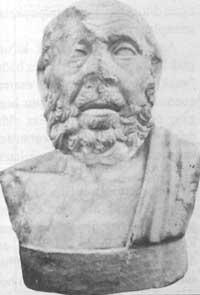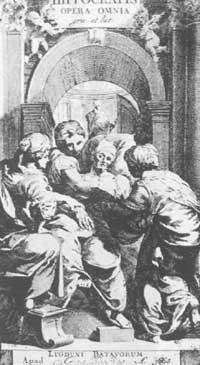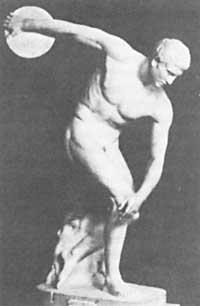Hippocrates, the foundation of medicine
1989/07/01 Bidaurrazaga, Angel Iturria: Elhuyar aldizkaria
In the fifth century prenatal Jesus Christ emerged Hippocratic Medicine through the Kos school. Kos, hometown of Hippocrates, is a small island close to present-day Turkey. The students of this school wrote the book “Corpus Hipocraticum”, in which they collected the knowledge of their Master. His main merit was to systematically learn the peculiarities and consequences of diseases. Until then medicine had a mythical explanation, since diseases were considered a divine punishment, but then scientific medicine began.

In those times the disease was a punishment of the higher gods, so the ability to transform it into health was witches and witches. As these were considered superbeings, they performed ritual tasks to eliminate the cunning of the gods. Therefore, what we know today of the diagnosis was that they considered him a fortune teller, our announcement was a sign and the current drugs or treatments were poisons or conjurists of that time.
At the birth of philosophy, they began to rationally study Nature. Philosophers sought the causes of life and laws in Nature. When they discovered some rules of nature, they began to break the mythical explanation of the world. The main philosophers of this time (Aristotle, Pythagoras and Plato) began to explain nature from the point of view of reason. Then Empécoles de Agrigento explained the theory that Nature had four basic elements.
In this theory all living beings had 4 components: water, earth, fire and air. This theory was accepted by Aristotle. Polirio, Hippocrates' son-in-law, wanted to explain the character of the living through the Theory of Humor, related to the theory of the previous elements. Each mood has a basic element: earth to physical humor, water to liquid humor, fire to energetic humor and air to gaseous humor. In each mood an element predominates, including others.
Taking advantage of the previous theory, Hippocrates devised his typobiological theory. He applied this theory to Medicine, his theory of 4 humors. Each mood consists of a mixture of elements, in which an element predominates. In this way, in black bile the main element is the soil, and refers to melancholic typology. In yellow bile fire is dominant and corresponds to biliary typology. In blood he sends the wind and refers to the bloodthirsty. Water in the pituitary gland, corresponding to the peaceful ones. The superiority of a mood will generate a series of constructive peculiarities both physically and psychically.
In the same way, they would have the facility to suffer some special diseases. Calmants, for example, would be thin and depressive and could suffer pneumonia. Hiprokrates believes that the disease is due to the imbalance of humors, both by excess and by default. The lack of proportion of the humors leads to their decomposition by a rot process. To cure diseases is to return to balance, giving what is missing or eliminating what is too much.
The process of human recovery or his ability to return to equilibrium was known as Phisis. Phisis can return as self-regulation or homeostasis. When this phisis or strength is not enough to complete the disease, Hippocrates stated that healthy life measures, that is, Dietetics, had to be applied. Healthy living habits or dietetics are divided into five main sections: food, active life, profession, economic situation and particularities of each municipality.
Food imbalance can cause disease, both by excess (e.g. obesity) and deficiency (e.g., abitaminosis). In this section the work of the doctor can be evident, for example, for terauptic purposes, through special diets.
Complements of active life, gymnastics, sports, walks, strength competitions, etc. are. The hippocratics considered the social sphere of health, even if it seems a modern concept. In the final component of dietetics (particularities of each country), Hippocrates took into account time, geography, religion and culture.
If the phisis or strength of a patient and the dietary measures prescribed by the doctor were not enough, we must use the Therapeutics. Terauptics is a treatment of diseases that can be of three types: Mental, physical and chemical therapy.

Mental therapy or health education is patient education. It is said that before forming the body the soul must be formed. Hippocrates said that the sick can help the doctor in three ways: with his strength, his obedience and his intelligence. Psychological treatments, psychoanalysis, hypnosis, etc. would enter.
Physical therapy includes treatments using physical elements: magnetotherapy, hydrotherapy, heliotherapy,...
Chemical therapy refers to pharmaceutical treatments and this is the main reference in medicine today. Medicines come from different sources: plants, animals or minerals. Medicines can be used for four purposes.
These four objectives define four types of therapies:
- Antipathy or contrary therapy. For example, the use of antithermal to lower fever. The same can be said of antibiotics.
- Allopathy or therapeutic of different effects. They do not oppose directly, but by some indirect way. For example, diuretics are used in hypertension.
- Homeopathy or therapy of uneven effects. For example, deinflammatory apis (an inflammatory agent from wasp venom) is applied at very low concentrations.
- Catheterization or expulsion drugs. There are five types: diuretics, anaforetics (sudan), purgantes, hemetics (expel) and expectorants.
All of these types of previous therapies can be used individually or together. If you do not manage to cure the disease you have to think about surgery (it is said to be a failure of Surgical Medicine). Surgery has a large number of intervention techniques: removal, repair, transplantation, etc.
Finally, Hippocrates claimed that if surgery did not reach its goal, it would get the “fire.” This concept of fire then can be changed from current radiation therapy and in many cancers is now used as the last therapy.
As a summary, about Hypocrates therapy we can say that: What does not cure Phisis, Dietetics, Therapeutics, Surgery and Fires will not cure anything. It is the end of phisis and death comes to the patient.

Gai honi buruzko eduki gehiago
Elhuyarrek garatutako teknologia




